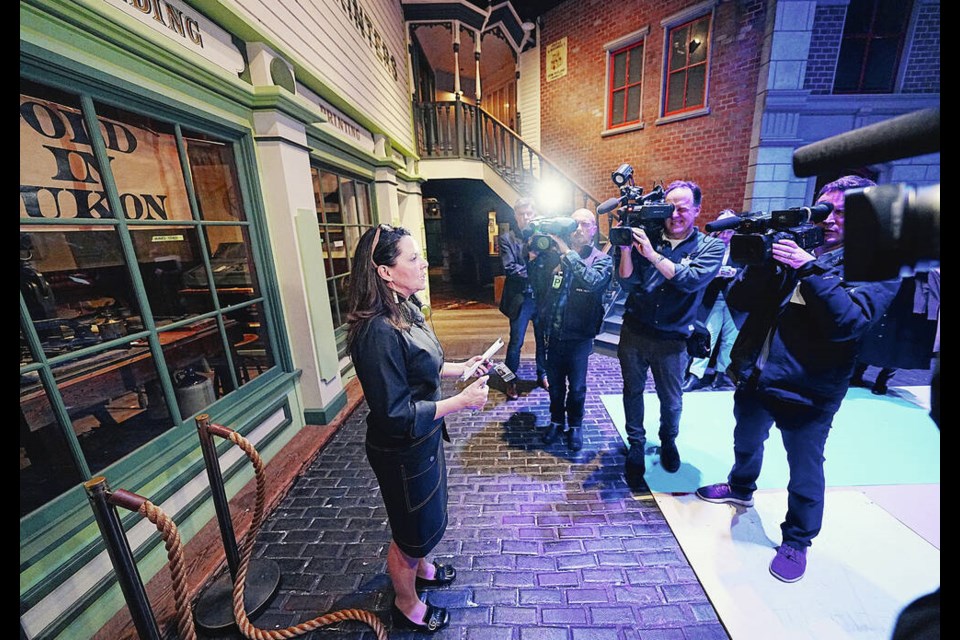There was lots of background during a media tour on Monday about how sensitive and complicated the Royal saąúĽĘ´«Ă˝ Museum’s closed-off third floor is.
But there’s no clear sense yet about what is going to happen to what used to be the prime attraction — Old Town.
The third floor, including the First Peoples gallery, Old Town, Chinatown, resource industry exhibits and the representation of the Discovery ship, was shut down Jan. 2, 2022 with two months notice, to the dismay of many. The stated reason was “decolonization.” It was deemed necessary to start the long-term work of creating new narratives that include under-represented stories.
Five months later a $780 million redevelopment plan was announced that would have seen the entire building closed for up to eight years while a new facility was built.
That turned into a fiasco and it was abandoned weeks later. An extensive consultation on what to do next is now underway that could last for years.
A revelation last month that Old Town has been left largely-untouched prompted a renewed round of debate about the shutdown, and speculation about whether the floor could be re-opened while the consultation is underway.
Tourism Minister Lana Popham, who arranged the tour, is staking out a position in favour of a quick re-opening in some fashion.
“What people will see is the Old Town is mostly intact, and they’re going to wonder why it’s not opening … why we can’t just tell a different story,” she told reporters.
She cited numerous logistic and curatorial factors, “but I think there’s a lot of sadness generally, in this community, because it’s a place where people went quite often… I think there’s an opportunity to get things up and open for people.
“The sooner the better.”
The exact timing she left to the RBCM board and CEO Alicia Dubois, who was alongside and conducted most of the tour.
Popham deferred to her, with: “My expectations might not be based in the reality of what the work that needs to go on. … But I personally would like to see that there is more access to the third floor and Old Town by the summer.”
“Personally” is the key word. Because Popham’s preference to make this nagging problem go away doesn’t necessarily mesh with Dubois’s outline of what’s going on and why.
Dubois said museums all over the world are changing their approaches, making sure that the stories being portrayed in museums remain the control of the communities … “so we’re not telling their history for them.
“We have a number of diverse communities who’ve never had an opportunity to consistently be the one who tells their own story.”
The main reason Old Town was not dismantled is that there is asbestos behind the walls. Disturbing anything makes it dangerous, she said.
So the “bones” of Old Town will stay unless ordered otherwise. But what they do with the framework is anyone’s guess at this point.
Dubois said people have a real affinity and care for Old Town. But whenever it comes up there are others who feel it is time for a broader conversation.
Dubois said, subject to public opinion, the RBCM is interested in “a much more mosaic approach.”
The third floor now portrays the First Peoples and settlers’ lives separately which doesn’t reflect the storyline of history.
As well, some of the display cases in the First Peoples gallery are empty now, reflecting increased repatriation of exhibits back to communities from where they came.
The point-blank question was: “When will this be open again?”
Dubois said it depends on the feedback and the RBCM’s ability to curate the stories.
“It’s hard for me to say when specifically this is going to be open. I suspect what we will do is take it in phases.”
There aren’t many examples where the sensitive issues of portraying differing histories have been resolved quickly.
Subject to an explicit order from Popham, there’s no reason to think the RBCM is going to provide one.
Just So You Know: Friday’s column referred to a comparison of provincial funding of the Island Coastal Economic Trust to other regions where economic development enterprises operate with far more money.
To clarify, the numbers from elsewhere are aggregate totals of various different funds in each region, some with different sources of revenue, not a direct comparison of the same model.
>>> To comment on this article, write a letter to the editor: [email protected]



